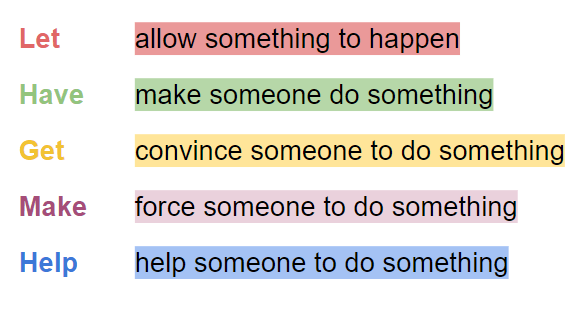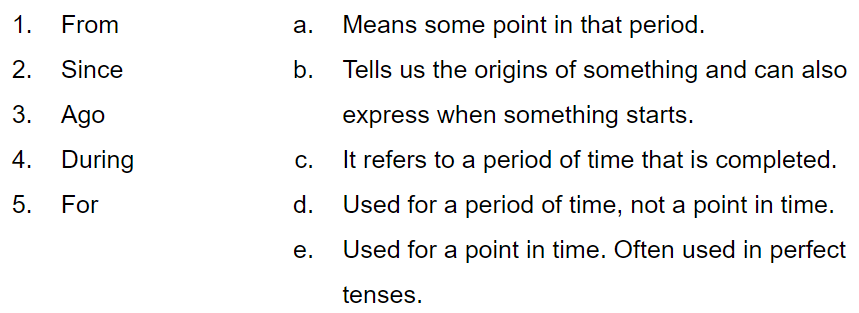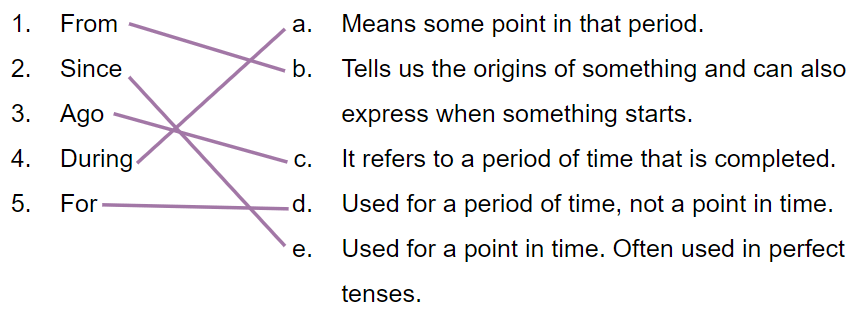Fill in the blank with either: so, such, so much, so many
He is ___________ a nice guy.
such
When is Past Perfect Simple used?
When we’re already speaking in the past tense and want to talk about something that happened before.
What is the difference between the Past Perfect Simple and the Past Perfect Continuous?
Past Perfect Continuous is used to show longer actions.
(Bonus points if they mention how they are similar! They both are used with past tenses to show something that happened before that.)
can, could, should, may, must, might, used to, have to
(Bonus points for naming more than three!)
Which auxiliary verb is used for things we are 90-100% sure are true?
must
Name three "asking" verbs.
want, need, would like, request, ask
Name three causative verbs.
let, have, get, make, help
Fill in the blanks with either the preposition: to or for.
1. She became an actress _____ the fame.
2. I worked there _____ three years.
3. The train is heading ______ Venice.
for; for; to
Identify the action that is in the Past Simple and the action that is in Past Perfect Simple.
When I arrived home, my sister had already gone to bed.
Past Simple- When I arrived home.
Past Perfect Simple- My sister had already gone to bed.
__________________ is used for simple, unique actions.
__________________ is used for longer, continuous actions.
Past Perfect Simple; Past Perfect Continuous
What can the auxiliary verbs, may and can, be used for?
To ask for permission.
What can the auxiliary verb, should, be used for?
Used to give advice or express opinions.
(One of these answers is fine!)
What is the pattern you use when you want to ask someone to do something?
subject + “asking” verb + to + verb
Match each causative verb with its meaning.


The preposition, to, is used with a verb to explain why something happens. Make an example sentence using 'to'.
Various answers are acceptable. (ex: I study hard to get good grades. I work fast to finish my work quickly.)
Name two ways you can use the Past Perfect Simple tense.
Something that started in the past and continued at that time; an action that had just finished; can be used with since, for, never, already, just, yet; can only be used with other past tenses like past simple & present perfect.
(Bonus points if they name more than two!)
What is the pattern for the Past Perfect Continuous tense?
subject + had been + verb -ing
What pattern do you use with the Present or Past Continuous tense and an auxiliary verb?
auxiliary verb + be + verb -ing
Fill in the blanks with either: used to, be used to, get used to
1. I _____________ live in Germany as a kid.
2. We ____________ living here.
3. I will ______________ working a lot.
used to; are used to; get used to
You can use an "asking" verb; you can ask a question; you can use an imperative.
(Bonus points if they give more than one way!)
Which causative verb should you use in the sentence below?
We ______ our kids to start eating healthier.
got
Match each preposition with its use.


Make an example sentence using the Past Perfect Simple.
Various answers are acceptable. (had + participle)
Past Perfect Continuous can show the cause of a past action. Make an example sentence in the Past Perfect Continuous with this use.
Various answers are acceptable. (ex: I’d been traveling all day so I was exhausted.)
What tenses can you use with the pattern below? (Hint: There are two).
auxiliary verb + verb
Present Simple and Past Simple
What is the difference between "be used to" and "get used to"?
Be used to- something you are accustomed to.
Get used to- You become accustomed to.
Make an example question "would you like".
Various examples are acceptable.
What is the pattern we use for the causative verb, help?
Help + person/object + verb
Fill in the blanks with the correct preposition: since, from, for, during, ago
1. We're coming home ________ school.
2. We go swimming __________ the summer.
3. I just got home five minutes ________.
from; during; ago
Turn this Past Perfect Simple sentence into a Past Simple sentence.
She’d been miserable in her marriage and had divorced only after she’d raised her kids
She was miserable in her marriage and divorced only after she raised her kids.
What is the sentence below emphasizing?
I needed a holiday because I’d been working so hard.
It's emphasizing the duration of the action. How long/hard the person has been working.
Make a sentence using the auxiliary verb, can, to express ability.
Various answers are acceptable!
Make a sentence using the auxiliary verb, can't.
Various answers are acceptable! (As long as it expresses something that is not a possibility.)
How can we change the question below to make it more polite?
"Do you want something to drink?"
Change it to "Would you like something to drink?"
What is another meaning of the causative verb, have?
I can also mean "I hired someone to do something." OR it can cause something to be done.
(Either answer is acceptable.)
Fill in the blanks with: so, such, so many, so much
There are ________________ people at this party!
so many
Make an example sentence in the Past Perfect Simple, using it with: since, for, never, already, yet, OR just.
Various examples are acceptable! (had + participle)
What is the difference between these two sentences? Names the tenses and the uses of each.
1. I’d visited London a few times and I moved there.
2. I’d been visiting London a lot over the years.
Sentence #1 Past Perfect Simple; emphasizes the result of the action.
Sentence #2 Past Perfect Continuous: focuses on the duration of the action.
must & have to
Make a sentence using the auxiliary verb, must.
Various answers are acceptable. (As long as it expresses a definite possibility.)
Ask for something in a question form using: can, will, would, could
Various answers are acceptable!
What causative verb best fits the sentence below?
Oh no! I ________ the fish overcook!
let
Name one use of "to" and one use of "for".
To- used to explain why something happens with a verb, expresses movements towards something, someone/something receiving an action, used to compare two things.
From- To explain why something happens with a noun, to give a length of time or distance, used with subjects that are things.
(Bonus points if they name more!)
If you're going to use Past Simple instead, it's best to use certain words with it to help with the order of actions. What are the words you should use with it? (Hint: there are 3).
when, after, before
What tense is the sentence below in and what is it being used for?
We couldn’t take our flight because we’d forgotten our passports.
Past Perfect Continuous; it shows two events in the past that are related.
Make an example sentence using an auxiliary verb with a Perfect tense.
Various answers are acceptable. (auxiliary verb + have/have been + verb)
Make an example sentence using the auxiliary verb, should.
Various answers are acceptable. (As long as it expresses an opinion or gives advice.)
What is the most casual way you can ask someone to do something for you?
By using an imperative.
Make a sentence using the causative verb, made.
Various answers are acceptable. (Make + person + verb)